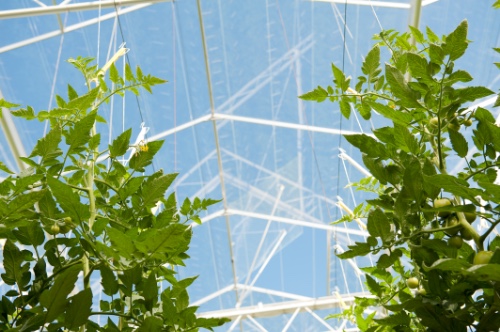Sustainably grown

We are constantly taking steps to reduce our impact on the environment when it comes to energy, water, pesticides, and a 100% recycling rate.
Energy
Gas remains the major source of energy for heating greenhouses. Our growers understand that fossil fuels won’t last forever. That is why they strive to use energy as economically as possible and are always looking for alternatives. Our use of natural gas has fallen drastically over the last ten years. We can now grow 140 kg of tomatoes using 60 m3 of natural gas, compared to 40 kg back then. Want to find out how our growers use energy and what alternatives they use? Watch this animated video.
Water
A great deal of water is required to cultivate vegetables. At the same time, the amount of agricultural land available is decreasing. All while we need more food to feed our growing population in the future. Our growers understand that water is a scarce resource, so it needs to be used as efficiently as possible. They endeavour to produce healthy and nutritious tomatoes, peppers, aubergines, and cucumbers with as little water as possible. Want to know how our growers manage to do this? Watch this animated video.
Crop protection
We as a society want to reduce the amount of pesticides we use in agriculture. And our growers are fully behind this. They use 100% biological crop protection and pollination methods, combating pests and diseases and pests in a natural way. Sometimes, we do need to use chemicals in places where a plague has broken out. But our growers avoid this wherever possible. The best way to prevent this is by ensuring optimal growing conditions for plants every day. Together with research institutions and other stakeholders, they look for ways to make their crops strong and resilient. Want to know how our growers do this? Watch this animated video.
On track to 100% Recycling
Although our growers sort and recycle all the resulting waste as much as possible, they sometimes have to discard products that fail to meet their high standards of quality. Within DOOR, we have a working group that studies ways to turn imperfect fruiting vegetables into new products. This means one less waste stream. We aim to reuse or recycle everything in our waste streams in the future, so we don’t have to throw anything away. In essence, we’re on track to reach a 100% recycling rate. Want to find out more about how we do this? Watch this animated video.
Source: cooperatiedoor.nl/en/
Would you like to know more? Discover more sustainable projects
Activate the shopper to consume tomatoes at unexpected moments
With breakfast, for example. Curious about the positive effects?

